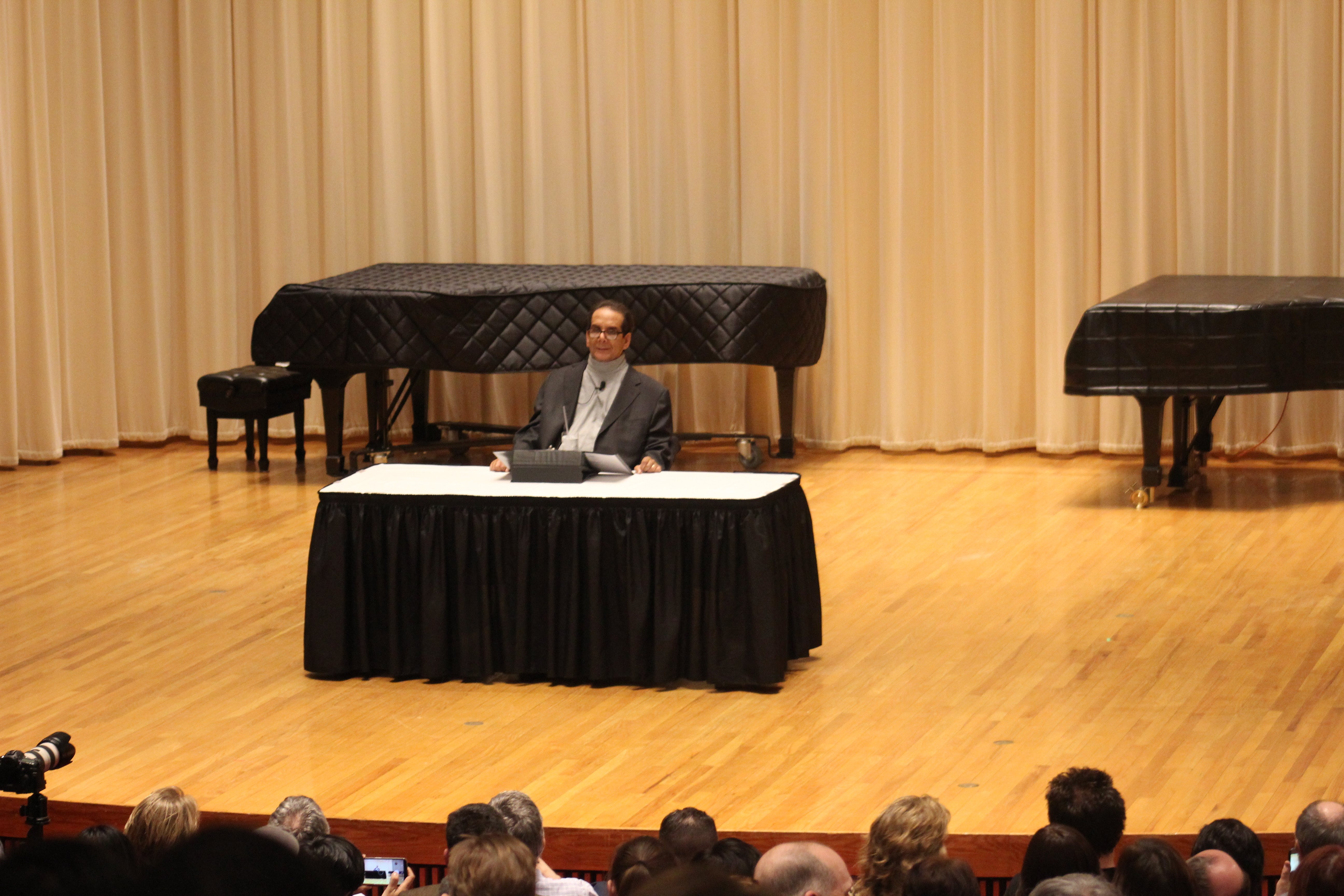

Members of the college and town community filled Buckley Recital Hall to attend a talk by Charles Krauthammer, political commentator and Pulitzer Prize-winning columnist, on March 9.
Krauthammer is currently known as a nightly panelist on “Special Report with Bret Baier,” a political discussion show on Fox News, and also contributes weekly to the conservative opinion magazine The Weekly Standard. He worked in psychiatric research at Massachusetts General Hospital before re-orienting his career toward politics.
Krauthammer based his talk on his latest book “Things that Matter: Three Decades of Passions, Pastimes, and Politics,” a collection of essays on a variety of topics including American history, embryonic research and his personal experiences. The book was published in October 2013 and held a spot on the New York Times’ nonfiction bestseller list for 38 weeks.
This was Krauthammer’s second visit to the area in recent years. The University of Massachusetts Amherst GOP, a student-run organization, invited him to speak on his book last April.
Prior to the talk, Krauthammer spoke at an exclusive question-and-answer session with a group of students.
“We were there for about an hour and thirty minutes, and asked about four or five questions,” Emmanuel Osunlana ’18, who was present at the question-and-answer session, said. “With each, he spent about fifteen minutes fully answering the question. It wasn’t just rhetoric or buzzwords. With each response, I felt that it was coming from a place where he had really thought about the issue for a long time.”
Professor of political science Javier Corrales introduced Krauthammer, who opened his talk with quips about the trajectory of his career and his experiences working with federal politics.
“I’m sometimes asked to compare what I do today as a political analyst in Washington with what I used to do as a psychiatrist in Boston, and I tell them it really isn’t that different,” Krauthammer said. “In both lines of work, I deal everyday with people who suffer from paranoia and delusions of grandeur. The only difference is that in Washington, they have access to nuclear weapons.”
Krauthammer said that he was officially supposed to talk about the state of conservatism in America, but he spoke first about the impact of liberalism and the Obama presidency on contemporary political discussions.
“I would argue that over the last seven years, just about every major debate we have had as a country — from the stimulus, to Obamacare, to foreign policy, to the deficit and debt — have all been, and can all be, subsumed under one more general question,” he said. “And that is, what is the proper size and reach and scope of government?”
According to Krauthammer, the United States is in an era of particularly intense political debate, brought about partly by the ambitions and efforts of President Obama. He argued that Obama is “not your normal, mainstream, center-left liberal,” and is instead a “closet social democrat,” who kept his beliefs largely hidden during his first campaign for election. Krauthammer said that Obama’s ideal vision for the United States resembled the social democracies present in Europe today, and that for liberals such as Bernie Sanders and Obama, the highest ideal is equality, a focus that is out of step with American tradition.
Krauthammer spoke about the impact that these conflicting beliefs had on political conversations nationwide.
“This overeager, overreaching — as a conservative, that’s what I would say — aggressive social democratic agenda struck a chord and created an amazing, spontaneous, undirected, unorganized, disorganized resistance,” he said. “It went by the name of Tea Party, came out of nowhere, and was a direct result of this initial two years of the Obama administration.”
Krauthammer went on to say that although the Tea Party originally fought against higher taxes, it gathered a wider base of support against Obamacare, widened its focus beyond social and economic issues and kindled today’s “great debate” about the role of the American government. He said that Obamacare’s mandates alienated a significant portion of the electorate, eventually helping to bring about the Democratic Party’s defeats in the 2010 and 2012 congressional elections.
Krauthammer said that he wrongly expected the Republican Party to win the presidency in 2012, criticizing the nomination of Mitt Romney, who had worked on a healthcare bill similar to Obamacare while serving as the governor of Massachusetts.
“The fatal mistake that I made was underestimating the uncanny ability of the GOP to lose un-loseable elections,” he said.
He denied the claim that the two parties have taken on different roles in electoral politics, with Democrats consistently winning the presidency, and Republicans only taking over Congress and state legislatures. He mentioned that Obama “did a good job of showing people that he cares,” and that “if you’re a Democrat and you think that you’re going to glide into the future on a demographic wave, you have to assume that your future candidates are going to have the same charismatic effect in vastly increasing the turnout for the presidential election.”
He spoke on the growing importance of personality in presidential elections, and said that in the midterm elections, the focus is on issues and policies, but in presidential politics, personality is key.
“It’s become a personal battle,” he said. “It’s reached a point I don’t think has ever been reached — a low point in presidential candidates’ discourse. Donald Trump is a populist. He’s not a conservative. He might have a conservative idea here and there, but he also has all kinds of ideas here and there.”
After the talk, Krauthammer answered audience members’ questions at length, touching on subjects such as the future of Obamacare and the current Supreme Court vacancy.